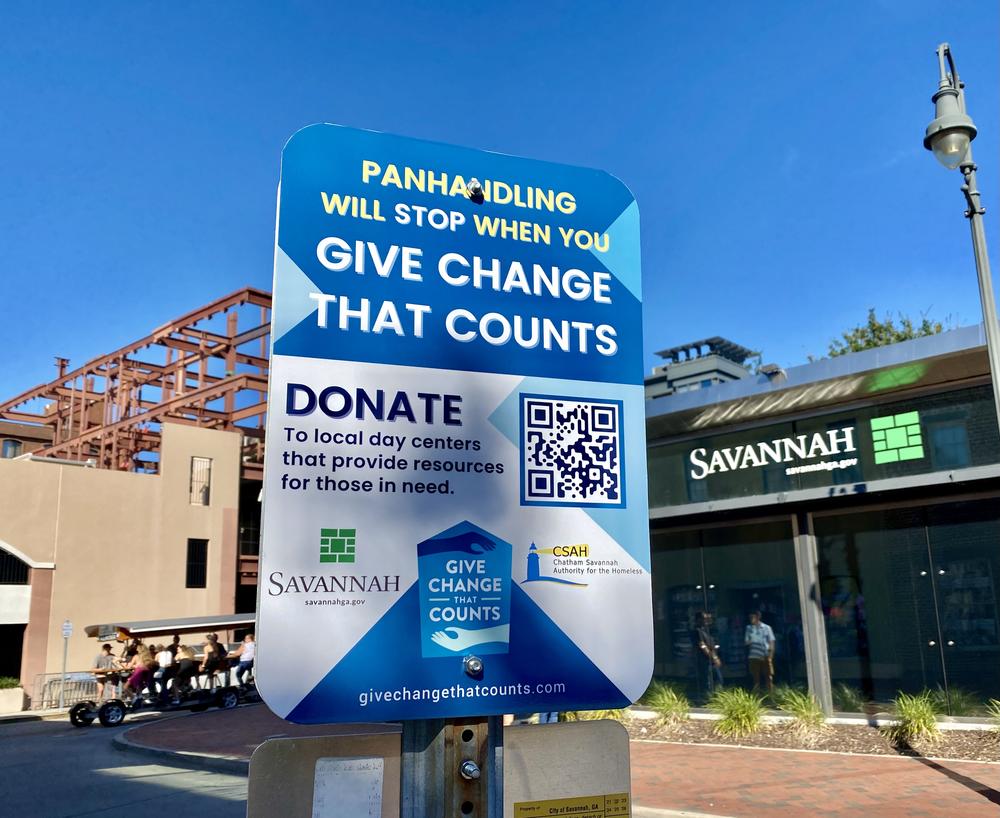
Caption
A sign posted near Ellis Square in downtown Savannah is part of a campaign by the city and a local homelessness nonprofit to solicit donations for four day centers.
Credit: Benjamin Payne / GPB News
LISTEN: Under the banner of giving “change that counts,” a new signage campaign uses QR codes to raise funds for local day centers. GPB's Benjamin Payne reports.

A sign posted near Ellis Square in downtown Savannah is part of a campaign by the city and a local homelessness nonprofit to solicit donations for four day centers.
Visitors to Savannah's popular downtown may notice a new kind of street sign — not for directing traffic, but rather for driving in donations to local homeless services.
“Panhandling will stop when you give change that counts” reads more than 100 signs being installed in pedestrian-heavy areas by city officials, with each one sporting a QR code to an online donation portal supporting four local day centers which serve people experiencing homelessness.
The intent of the signage and its underlying campaign is to educate locals and tourists on where their money would, according to lead nonprofit Chatham-Savannah Authority for the Homeless, better serve solicitors who they might encounter.
CSAH executive director Jennifer Dulong said that day centers were identified last year as “a gap in services,” compared to traditional overnight shelters.
“During the day, there were very few places that an individual could go, who may feel the need to panhandle or who may also be experiencing homelessness — that they could get out of inclement weather and have a safe haven space for them to charge their phones, potentially get a shower, wash their clothes, get a hot meal, get hydration, get connected to services,” Dulong said.
Donations made through the QR code portal go to CSAH, which in turn uses the money to support four day center facilities operated by Union Mission, Salvation Army, Family Promise of the Coastal Empire, and Come as You Are Deliverance International Ministries.
Dulong added that the signs are “in no way suggesting that panhandling is an illegal activity. It's legal. It's free speech. That's not what this initiative is about. This initiative is about a meaningful way to invest in [day centers] to help provide critical services for people who may feel the need to panhandle and those who are experiencing homelessness.”
Savannah City Manager Jay Melder lauded the signage campaign as an effective way to bring visitors into the fold of addressing homelessness, saying that it “gives people the ability who may not want to give, for whatever reason, to somebody asking for money, but know that in their heart they want to help — here's a place that you can donate some funds to, that you know is going to be going to support services that are going to make a difference in people's lives.”
Similar signs are being prepared for installation along busy roads in Chatham County, where panhandlers are often in harm's way due to traffic. Those signs will not include QR codes, as handling a phone while driving is dangerous and illegal.
Augusta officials have contacted CSAH to learn more about the signage campaign, Dulong said, and have expressed interest in creating a similar initiative of their own.